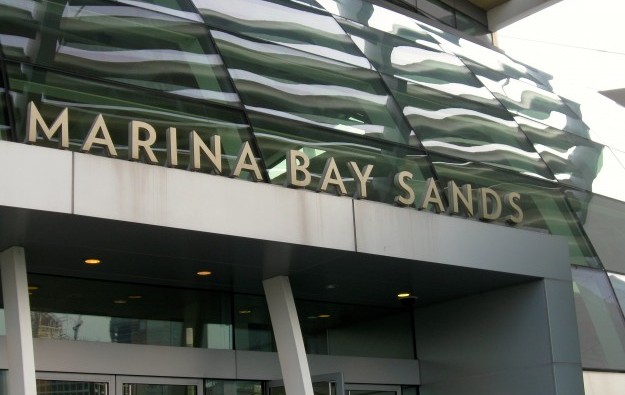HK businessman sues MBS over use of pooled chips
Jan 14, 2015 Newsdesk Industry Talk, Latest News, Singapore

A businessman from Hong Kong has sued Marina Bay Sands (pictured) in a Singapore court, seeking damages for wrongdoing and breach of contract. Cheung Che Kin claims he suffered losses when casino staff prevented him from taking over a baccarat game from a combined pool of chips he shared with a friend, according to documents from the Singapore High Court cited by the Straits Times newspaper.
Marina Bay Sands denies that Mr Cheung has suffered loss and damage and has filed a counterclaim for payment of outstanding credit amounting to US$1.96 million, plus 12 percent interest, from the high roller. The MBS action, filed in Hong Kong last July in order to recover the money from Mr Cheung, has been put on hold with both parties’ consent, according to the report.
The incident took place over two days in December 2012 when Mr Cheung and an associate, Qian Si Jie, visited the casino resort. Mr Cheung claimed he informed the casino that he and Mr Qian would be playing together from a combined pool of chips and that the casino raised no objections.
The two men played baccarat in one of the casino’s high-roller rooms, betting from the combined pool of chips without any objection from staff, said Mr Cheung.
But when Mr Qian said he felt unwell and Mr Cheung attempted to continue playing, using the combined chips, he was refused permission, according to the court documents. He then left the premises. His friend later continued playing and in doing so used up the credit line and eventually lost to the house all the chips that had been issued.
Mr Cheung claimed in his suit that the actions of the casino staff were akin to a forced repayment.
Related articles
-
 MBS Tower 3 rooms revamp now by 2Q...
MBS Tower 3 rooms revamp now by 2Q...Jul 25, 2024
-
 Sands China 2Q EBITDA down q-o-q amid...
Sands China 2Q EBITDA down q-o-q amid...Jul 25, 2024
More news
-
 Donaco EBITDA up y-o-y to above US$4mln...
Donaco EBITDA up y-o-y to above US$4mln...Jul 26, 2024
-
 HK listed Palasino upgrades Czech...
HK listed Palasino upgrades Czech...Jul 26, 2024
Latest News
Jul 26, 2024
Border-casino operator Donaco International Ltd has achieved a 164.17-percent year-on-year increase in its latest quarterly group earnings before interest, taxation, depreciation and amortisation...Sign up to our FREE Newsletter
 (Click here for more)
(Click here for more)
Pick of the Day
”We’ve got more traction outside of Macau at the moment. But Macau’s going be a bigger focus for us”
David Punter
Regional representative at Konami Australia
Most Popular
 Sheraton brand to exit Londoner Macao, to be Londoner Grand July 25, 2024
Sheraton brand to exit Londoner Macao, to be Londoner Grand July 25, 2024  Macau regulator probes unlicensed gaming agents July 24, 2024
Macau regulator probes unlicensed gaming agents July 24, 2024  Philippines gives 20k aliens in POGOs 60 days to leave July 25, 2024
Philippines gives 20k aliens in POGOs 60 days to leave July 25, 2024  Philippines-listed DigiPlus says not affected by POGO ban July 24, 2024
Philippines-listed DigiPlus says not affected by POGO ban July 24, 2024  Sands China 2Q EBITDA down q-o-q amid low hold, renovation July 25, 2024
Sands China 2Q EBITDA down q-o-q amid low hold, renovation July 25, 2024






